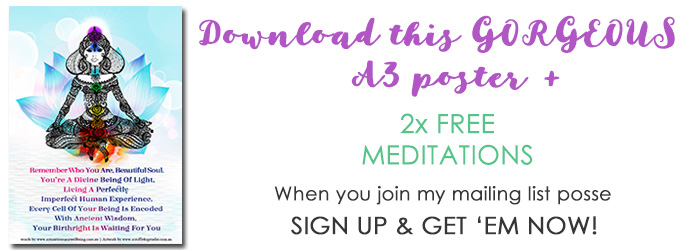In our society it’s considered taboo to be addicted to drugs, alcohol and to a lesser degree, gambling.
However…
There are many socially acceptable forms of addiction
Food, consumerism, Netflix, movies, TV, shopping, video games (Candy Crush anyone?!), emotional drama and conflict, technology, Facebook, and so on.
Even positive habits can become addictions, such as exercise and eating super healthily.
An addiction or obsession can be formed when…
- You feel like you can’t do without your habit or daily routine
- You’re compelled to do whatever it is you’re doing and feel helpless to stop
- You have habitual behaviour(s) you can’t or don’t wish to control
While drug, alcohol and food addictions can have obvious self-destructive ramifications, other forms of addiction can be just as damaging, if less visible at first.
It doesn’t matter what your “drug” of choice is, what matters is WHY
Why do we so easily fall in to habits and patterns that are ultimately not beneficial?
Why do we keep going even when we know they aren’t ideal?
Addictions are ways to avoid, ignore or even medicate ourselves against the world.
We might be trying to avoid feeling how we feel, and/or use our addiction to manage our stress levels.
However it’s all the same thing: a distraction
I’d even go so far as to say that addictions are a way we can avoid the truth of who we really are (ie. not just this body or life).
By distracting ourselves, we get to avoid our own magnificence. Challenges that feel too hard or scary… we can deaden their song with the use of addiction.
While society looks down on drug or alcohol addicts, most of us have several somethings we do that fulfill our own addiction pattern.
An example that’s considered not only acceptable but normal, is emotional drama and conflict.
All of our “entertainment” is based on emotional drama
Think about it. Our TV news is all about drama and conflict. Movies and TV shows surround are about story and drama. We’re immersed in this, so is it any wonder that we’re addicted to experiencing emotional highs and lows?
It’s so deeply ingrained as a way of life that most of us don’t realise the dysfunction we’re living in: the pattern of creating conflict where it isn’t needed.
Then there’s the ongoing reinvestment in more of the same. And believing it can’t be helped or changed, and therefore just continuing to simply live in that space.
The conflation of love and strife as being part of the same package
Really? We *must* have drama and conflict with those we love? Hmmmm…
ALL of this is addiction and distraction.
The first thing addicts are asked to admit in therapy is their powerlessness over their circumstances.
That they can’t do it alone. They need help and support – via connection with others and with the divine.
As more people begin to wake up, we must address our addiction patterns in order to be free.
Note: this isn’t a guilt trip!
We’ve all displayed addictive behaviours, right?
Our entire society is built on a mindset of keeping us addicted, and living out patterns of behaviour. Consumerism on the whole, is exactly this – an addiction pattern.
Our job right now is to get curious and work out just what’s going on…
- What are we avoiding doing?
- What are our addictive habits that keep us from paying attention?
- And what’s needed in order to release that pattern so we can get on with it?
Much love,

 |
Ambha Amanda Roberts is a Kinesiologist, Intuitive Healer, educator and facilitator based on the Sunshine Coast, Australia. She offers Kinesiology sessions both in-person and via Skype/Zoom all over the world. Ambha Amanda is the co-creator of Adventures of Staria, which includes a series of Staria cards, and an upcoming book for children (including inner children). |


